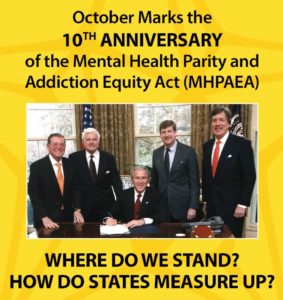
On the 10th anniversary of the Mental Health Parity and Addiction Equity Act, members of the mental health advocacy community, politicians, medical professionals, and other thought leaders gathered to discuss the state of mental health parity in our country. This convening, hosted by the Kennedy-Satcher Center, was both a celebration of how far we’ve come and a call to action for all the work that remains to be done. It was a gathering of mental health champions — individuals like Rep. Patrick Kennedy, former U.S. Surgeon Generals Dr. David Satcher, Dr. Vivek Murthy, and Assistant Secretary for Mental Health and Substance Use, Dr. Elinore McCance-Katz — who have been forces for positive change through their steadfast commitment to and wise action on this issue.
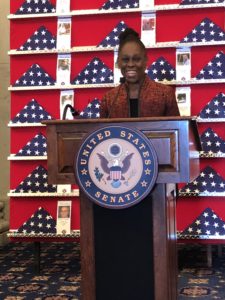
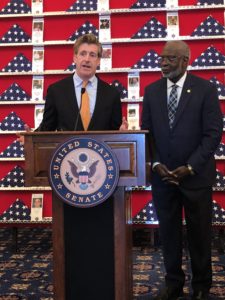
Left: First Lady of NYC Chirlane McCray
Right: Former Representative Patrick Kennedy and former Surgeon General Dr. David Satcher
The convening was also an opportunity to share an illuminating report that reviews the progress of mental health parity in every state. In these “report cards,” states received grades on how well they were promoting parity in practice.
Despite the federal law requiring equal coverage, the report found that 32 states were not in compliance — that is, they failed to ensure equal coverage for mental health.
Part of the reason for this is widespread lack of awareness. Mental health parity is an unfamiliar concept to many, though for the millions of Americans who live with brain disorders, such as depression and addiction, it is a critical aspect of healthcare. At the root of this lack of awareness is a fundamental misunderstanding that brain illnesses are in some way separate or different from those of other parts of our body. To understand parity and its importance, we must start by recognizing that our brain is as crucial an organ in the body as our heart or lungs.
With that understanding, it is impossible not to support and care about the MHPAEA — the landmark legislation spearheaded by Patrick Kennedy that requires insurers to cover mental health and addiction treatment in the same way they cover other physical illness. Though this requirement seems straightforward, the complexity of health insurance makes it difficult for individuals to assess whether their plan has parity. For this reason, it’s important that we all educate ourselves not only about brain health, but also about our benefits and, furthermore, to take action when parity is not upheld.
Collectively, we can hold insurers accountable and help make mental parity a reality in practice, not just on paper. One promising step is the new “Don’t Deny Me,” campaign. This resource has created a place for mental health care consumers to report illegal denial of coverage and a mechanism for holding insurers accountable. While in an ideal world, the law itself would be enough to protect individuals in need of treatment but this has not been the reality to this point. We all have a role to play in safeguarding this important right, and it starts with awareness. Patrick Kennedy’s young children were present at the convening providing a poignant reminder that we must take meaningful action for the future of our children.
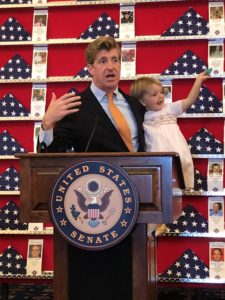
Former Representative Patrick Kennedy and his daughter
The gathering also coincided with a breakthrough in how we are addressing the opioid crisis, with Congress, through rare bipartisan action, passing important legislation to help those living with addiction. In these divisive political times, legislators’ willingness to reach across the aisle reflects the severity of this public health emergency. The bill, with its significant focus on expanding treatment, will impact individuals and communities across the country. It is a step in the right direction, and we need to build on this continued bipartisan collaboration to expand this initial progress into a long-term solution.
The #Parityat10 gathering highlighted the promise of dedicated focus, both on the part of lawmakers and everyday individuals. In the years since the MHPAEA was passed, we have made great strides in building mental health awareness, making it easier for people to get the care they need and deserve. It also reminded us of all that remains to be done and launched us further by revealing new information and tools — in the state reports and Patrick Kennedy’s new consumer action campaign, serving as catalysts for action. By following the lead of the mental health heroes who spoke at this historic event and acknowledging that advocating for inclusive healthcare is each of our responsibility, every one of us can be a force for positive change. We can all help ensure the promise of healthcare justice for every American and for every organ in the body, including the brain.
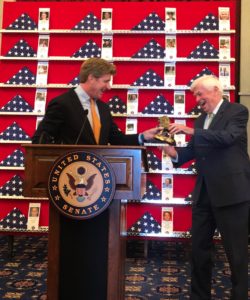
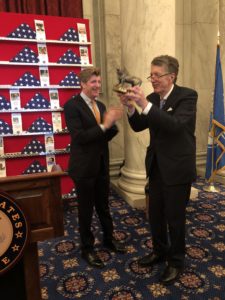
Former Senator Chris Dodd (left) and former Representative Jim Ramstead (right) were awarded the bronze lion for being mental health party champions.






